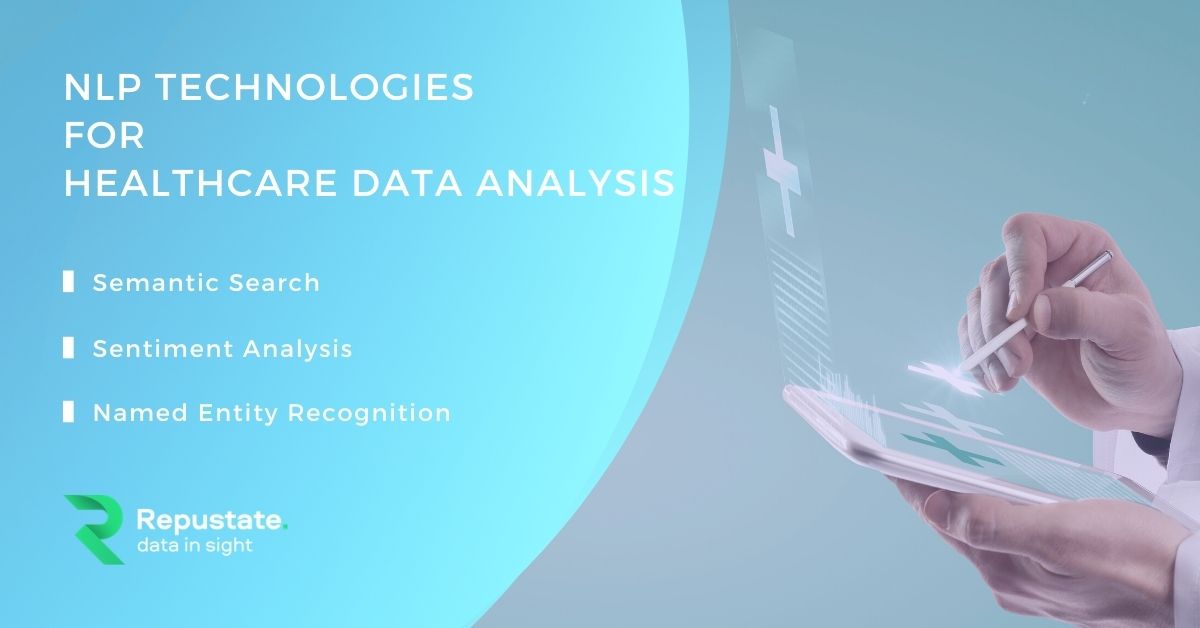
Analyzing healthcare data refers to the collection and analysis of patient data to improve medical care and patient experience. Patients go through a continuum of caregiving from diagnosis to recovery. This medical journey is called patient experience (PX). Artificial intelligence, in the form of machine learning, can be applied to this type of analytics to make patient experience data reviews faster, more accurate, and multilingual.
The quality-of-care interactions that patients receive at different points in their journey culminate as their holistic experience. Uncovering PX using healthcare analytics can help medical providers make required improvements across their enterprise.
Hospitals, for example, can collect patient feedback data using various means such as customer service calls, online forms, star ratings, interactive voice responses (IVR), and other digital methods. This data can then be processed to extract the most high-value insights such as patient sentiments surrounding themes, topics, and entities such as medical staff, wait times, communication, prescription dispensing, etc.
What is healthcare data analysis?
Healthcare data analysis can study past and present patient experiences to give medical organizations insights that can be used to improve the quality of care. There can also be an analytical study of industry-wide data where analysis can unearth patterns. These patterns are key to understanding and predicting trends that can be used to control diseases, enhance clinical research, and build better patient management systems. These revelations are vital information to healthcare providers.
How does data mining help the healthcare industry?
Data mining enables healthcare providers to have a better doctor-patient relationship, and in turn, offer improved patient care. On a global scale, data mining can help in advanced clinical trials and in the prevention of epidemic outbreaks. It is also valuable in health insurance fraud detection.
Patient feedback is a vital part of the healthcare data. When healthcare organizations allow patients to express their opinions and feelings, they feel more engaged. This is also called Patient Voice. People express their feedback through various means like surveys, reviews, and electronic medical records (EMRs.).
The first step after distributing surveys and collecting all that patient voice information is to mine the data. This is the process of extracting the most relevant information and then organizing it in a way that makes it easy to scrutinize for patterns and recurring themes. These results can also be scored for positive, neutral, or negative patient sentiments toward a variety of healthcare-specific themes such as medical staff, facility hygiene, patient service, waiting times, etc.
Using natural language processing for analyzing healthcare data
There are three technologies that are key in natural language processing (NLP) for conducting proper text mining and patient voice analysis of healthcare data. They are semantic search, sentiment analysis, and named entity recognition (NER).

Semantic Search:
One of healthcare’s biggest challenges is being able to search and find relevant information that is spread across a large medical enterprise. Especially, because the information is in various types of unstructured data storage. Semantic search is a pivotal game-changer in tackling this issue. Unlike the now outdated keyword discovery approach, semantic search figures out what a user intends to search when he enters a search query using everyday language.
NLP in healthcare enables this type of search and makes things super efficient and fast. It makes browsing healthcare data more accurate by understanding almost exactly what the search user is trying to ask, instead of simply matching keywords to pages. The ultimate aim of semantic search is to quickly provide healthcare workers with more relevant, precise search results to save time, create efficiency and eliminate discovery annoyance.
Most importantly, semantic search can help healthcare organizations drive business efficiency and improve workflow, while providing more robust, accurate patient voice analytics.
Sentiment Analysis:
There is nothing more personal and intimate than health. Being ill and receiving care can be a highly emotional experience. Often patients feel uncomfortable and helpless. A patient’s journey can be like a maze of emergency room triages, administrators, waiting rooms, nurses, doctors, medications, specialists, and therapists. These conditions can produce a heightened set of feelings if the experience is poor or fraught with frustrating circumstances.
Sentiment mining in healthcare data analysis empowers institutions such as hospitals, and even healthcare insurance companies, to be truly data-driven and confident in their strategic decisions. This is the reason that sentiment analysis is such a vital component of PX analytics. When artificial intelligence is applied to the scoring of emotions expressed within survey answers, the results begin to tell an institutional narrative of the patient experience.
Sentiment analysis, when added to patient voice data, begins to uncover areas where a healthcare provider may be offering less than satisfactory service. For example, when sentiment analysis is used, it might become clear that your patients are not being sufficiently informed by medical staff, or that long waiting times aggravate a patient’s already tense experience. Having a multilingual sentiment analysis can also give eye-opening insights to healthcare providers who have branches in different countries.
Health.Links uses Repustate’s AI-powered sentiment analysis to:
- Rate Comments using the Native Arabic Repustate’s Sentiment Analysis model developed specifically for that purpose. This helps classify comments into four categories [Positive, Negative, Neutral and Mixed]
- Aspect-Based Sentiment Analysis to theme patient comments into specific predetermined themes based on the Saudi Complaints Taxonomy.



























